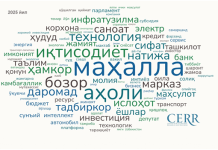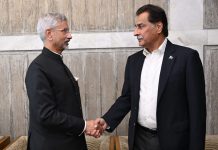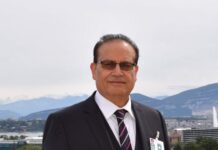By: Qamar Bashir
Faisal Vadha had warned six months prior that PTI’s iconic election symbol would be taken away. However, PTI, preoccupied with the aftermath of the May 9th incidents and the subsequent arrests of their leaders and workers, did not heed this warning or take preventive measures. Consequently, they lost their election symbol.
In another interview, after a dramatic gesture of prostrating on the footpath near the Supreme Court, Vadha warned PTI of even harder times ahead. But when confronted a PTI leader about Vadha’s another horrific prediction, he replied that they are already in deep trouble their mandate was stolen, they deprived of governance in Federation and provinces, their leader is incarcerated, their party is in shatters, what else could be additional hardships which could befallen on PTI?. Same was the question in others’ minds. But the answer came in the shape of the Punjab Government’s decision to file a case of high treason against the PTI leadership.
In an article titled “What was Wrong with Imran’s Video on X,” I pointed out that the video could not have solicited the angry reaction from the Pakistan Army, if it had merely attributed the reasons for the surrender of the Pakistan Army to the Indian Army to poor leadership, cowardice, lack of sound planning, logistic failures, and compromising the supply chain, without accusing the army of committing high treason as alleged in the video. This lack of diligence on PTI’s part may cost them heavily. The Punjab Government has used this video and the incidents of May 9 as a basis to lodge a case of high treason against the PTI leadership and pursue it relentlessly, creating another reason to keep Imran Khan in jail, if he somehow succeeds in securing his release in over 200 other cases.
The second indication of PTI’s increasing troubles came on July 4th, when the scheduled meetings between the PTI leadership and Imran Khan were canceled without any explanation. Additionally, Imran Khan’s freedom to communicate with his party leaders was restricted. When the jail administration was asked about the reason for these actions, they cited orders from the “high command.” When pressed further on who constituted the “high command,” they ambiguously replied that PTI knew them very well.
The fourth issue PTI is facing is the delay in the constitution of the Election Tribunals, even after five months have passed since the elections. This delay, successfully employed by the government, highlights PTI leadership’s failure to use their legal expertise to ensure the timely notification of these tribunals. Instead, the ordinance regarding the tribunal’s composition was challenged in the Lahore High Court and subsequently in the Supreme Court. In compliance with Supreme Court orders, further proceedings have been postponed until August 2024. This delay aligns with the government’s objectives to buy time and allow the opposition to settle with the current election outcomes, rather than pressing for redressal of their election grievances.
To add insult to injury, the party is facing steep criticism from former PTI stalwarts like Ch. Fawad Hussain, Mr. Zaidi, and other leaders for lacking a concrete and coherent political strategy to secure the release of the party founder. According to these critics, in the absence of a political strategy, which is the current situation, there is no chance of Mr. Imran Khan’s release in the near or distant future.
Interestingly, PTI’s leadership failures at home were compensated by its gains abroad.
The overseas party supporters demonstrated exactly what is lacking in PTI’s current leadership in Pakistan. They set an initially elusive target, built strong teams across the United States and successfully convinced Congressman Rich McCormick of Georgia and Congressman Dan Kildee of Michigan, along with over 100 co-sponsors from both parties, to introduce a resolution demanding an independent investigation into allegations of election irregularities and the release of Imran Khan. The resolution passed with unprecedented success, receiving 368 votes in favor and only 7 against.
This remarkable achievement was widely acknowledged by the media, analysts, and commentators worldwide. Even PML(N) veteran leader Mr. Irfan Siddique termed it a significant accomplishment for PTI, unparalleled in Pakistan’s history.
The U.S. chapter of PTI did not stop there, but inundated the United Nations Working Group on Arbitrary Detention with complaints, dossiers, and evidence. Their relentless efforts culminated in a significant achievement: convincing the UN Working Group to declare that the detention of former Prime Minister Imran Khan was “arbitrary” and violated several international laws and norms. The working group concluded that Khan’s prosecution lacked legal basis and appeared politically motivated to disqualify him from running for office besides expressing the concerns about the broader campaign of political repression against Khan and his party.
Another pivotal element in the puzzle surrounding PTI’s challenges and potential emancipation is the ongoing case sub-judice before the Supreme Court of Pakistan, SIC versus Election Commission. From observing the proceedings, it is abundantly clear that neither the Chief Justice nor the brute power of the state will influence or scuttle the judgment of any member of the larger bench. We can expect a decision that may surprise both the executive and the government alike. This decision is likely to have a significant impact on the composition of the National and Provincial Assemblies, and consequently, on the composition of the government in the Federation and the province of Punjab.
It goes without saying that both the government and the supra-executive are also monitoring the historic proceedings of the Supreme Court and have likely already begun developing contingency plans to salvage their majority in the National Assemblies and their governments.
It is up to PTI to set aside their internal petty and egoistic differences and develop their own contingency plans to reap the maximum benefits from the energy generated in their favor by the U.S. Congress, the United Nations Working Group, and the Supreme Court of Pakistan.
By: Qamar Bashir
Former Press Secretary to the President
Former Press Minister to the Embassy of Pakistan to France
Former MD, SRBC

















